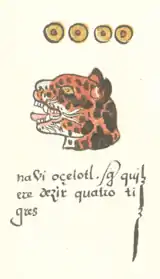ocelotl
See also: oçelotl
Central Nahuatl

Ocelotl, “jaguar”.
Etymology
From Classical Nahuatl ocelotl.
Pronunciation
- IPA(key): /oˈseː.loːtɬ/
Synonyms
- (jaguar): tecuani
Derived terms
Terms derived from ocelotl
Cholula and Milpa Alta
References
- Medina, Genaro (1999); online Curso de Náhuatl, Universidad de las Américas; San Pedro Cholula, Puebla, Mexico.
- Mancilla Sepúlveda, Héctor (2002); Lecciones de Náhuatl, Editorial Hirata; Mexico City, Mexico.
- Aguilar Carrera, Sergio (2012); Método práctico de lengua náhuatl del Altiplano Mexicano; Dirección de Casa de Cultura de Tecámac, State of Mexico, Mexico. ISBN 03-2012-030812540200-01.
- w:Panthera onca
Classical Nahuatl

The glyph corresponding to the day nahui ocelotl (“four jaguar”), as depicted in the codex Magliabechiano.
Pronunciation
- IPA(key): /o(ː)ˈseː.loːt͡ɬ/, [o(ː)ˈséː.loːt͡ɬ]
Noun
ocelotl anim (plural ooceloh or ocelomeh)
- (it is) a jaguar (Panthera onca).
- 1571, Alonso de Molina, Vocabulario en lengua castellana y mexicana y mexicana y castellana, f. 75r. col. 2:
- Ocelotl. tigre. […] / Ocelome. tigres.
- Ocelotl. a jaguar. […] / Ocelome. jaguars.
- ibid., f. 77v. col. 1.
- Oocelo. tigres.
- Oocelo. jaguars.
- Oocelo. tigres.
- c. 1600, anonymous author, Anónimo Mexicano, f. 7r:
- oquitlalílique miec ytlahuitol, ce cuauhtlí tlacuicuítl, ce ozelotl ycxitlan
- They buried him with very many of his things: his bow, an eagle carved of wood, a jaguar at his feet
- ibid., f. 11r.
- onca:ncamaía, tepe Zolime, totochtin, cuahtotolim, Mazame, oze lome, cuamíztin, tecuanímê
- There were partridges, rabbits, fowl, deer, jaguars, mountain lions, and savage beasts
- onca:ncamaía, tepe Zolime, totochtin, cuahtotolim, Mazame, oze lome, cuamíztin, tecuanímê
- c. 1609, Tezozomoc, Chimalpahin, Cronica mexicayotl, f. 22r
- camo çan quexquich yn ompa onoque yn ompa tlapia yn tequanime yn cuecuetlachtin. yn ocelome. yn mimiztin yn cocohua
- Countless fierce animals were there; bears, jaguars, mountain lions, snakes were on guard.
- 1645, Horacio Carochi, Arte de la lengua mexicana con la declaración de los adverbios della, f. 4v:
- ocēlōtl, tigre. Pl. ōocēlō. [...] ocēlōmê tigres.
- ocēlōtl, a jaguar. Pl. ōocēlō. [...] ocēlōmê jaguar.
- (it is) the fourteenth of the twenty day signs of the tonalpohualli; a jaguar or disembodied jaguar's head.
- 16th c., Codex Magliabechiano, f. 13r.
- naVi oçelotl. q qujere dezir quatro tigres.
- navi oçelotl. that is to say, four tigers.
- 16th c., Codex Magliabechiano, f. 13r.
Synonyms
- (jaguar): tecuani
Derived terms
Terms derived from ocelotl
- ocelocopilli
- oceloehuatl
- oceloiyataztli
- ocelomatetepontli
- ocelometl
- ocelomichin
- ocelopetlatl
- ocelopilli
- oceloquichtli
- ocelotamalli
- ocelotenamitl
- ocelotepotzohicpalli
- ocelotetl
- ocelotexochitl
- oceloti
- ocelotia
- ocelotic
- ocelotilmahtli
- ocelotlah
- ocelotlachicomitl
- ocelotlatzacuilli
- ocelotocatl
- oceloxochitl
- oceloyotl
- tlahcoocelotl
- tlalocelotl
Proper nouns derived from ocelotl
- Oceloapan
- Ocelotepec
- Ocelotlan
Descendants
References
- Alonso de Molina (1571) Vocabulario en lengua castellana y mexicana y mexicana y castellana, Editorial Porrúa, pages 75r, 77v
- Carochi, Horacio (2001) James Lockhart, transl., Grammar of the Mexican Language, with an Explanation of its Adverbs (1645), Stanford: Stanford University Press, pages 30–31
- Chimalpahin Quauhtlehuanitzin, Domingo Francisco de San Antón Muñón (1997) Arthur J. O. Anderson, Susan Schroeder, transl., Codex Chimalpahin, Norman: University of Oklahoma Press, pages 70–71
This article is issued from Wiktionary. The text is licensed under Creative Commons - Attribution - Sharealike. Additional terms may apply for the media files.